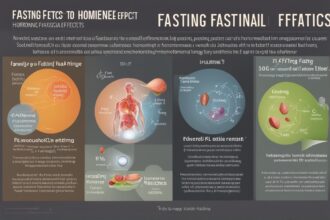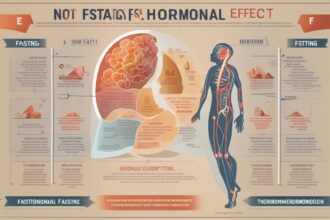fasting has taken the health and wellness world by storm, with practices like intermittent fasting and extended fasts gaining popularity for weight loss, mental clarity, and overall well-being. But have you ever wondered how hormones and fasting are connected? The intricate dance between fasting and your hormonal balance plays a pivotal role in how your body responds to periods of food restriction. In this post, we’ll dive deep into the hormonal effects of fasting, uncovering the science behind it, the benefits, potential challenges, and practical tips to make fasting work for you. Whether you’re a seasoned faster or just curious about how fasting impacts hormonal health, stick with me as we explore this fascinating topic!
What Happens to Hormones During Fasting?
When you fast, your body undergoes a metabolic shift that directly influences your hormonal balance. Without incoming food, your system prioritizes energy conservation and taps into stored resources like fat. This process triggers significant changes in key hormones like insulin, cortisol, and growth hormone. For instance, insulin levels drop during fasting, which helps your body access fat stores for fuel—a cornerstone of why fasting is linked to weight loss. Meanwhile, hormones like glucagon rise to maintain blood sugar levels. Understanding these shifts in hormones and fasting can help you appreciate why you might feel energized one moment and hungry the next.
Key Hormones Affected by Fasting
Several hormones are at the forefront when it comes to fasting. Let’s break down the major players and how they respond to periods without food:
- Insulin: As mentioned, insulin decreases during fasting, promoting fat-burning and reducing blood sugar spikes.
- Growth Hormone (GH): Levels of GH often increase, aiding in tissue repair and fat metabolism—key for anti-aging benefits.
- Cortisol: This stress hormone can rise initially as your body adapts to fasting, but balanced fasting helps regulate it over time.
- Leptin and Ghrelin: These hunger hormones fluctuate, with ghrelin (hunger) peaking initially and leptin (satiety) adjusting to signal fullness.
These hormonal changes during fasting aren’t just random; they’re part of your body’s survival mechanism, fine-tuned over millennia to handle periods of scarcity. By aligning fasting practices with your hormonal health, you can maximize benefits like improved metabolism and energy.
Benefits of Hormonal Balance Through Fasting
The interplay between hormones and fasting offers a range of health benefits when done correctly. For starters, the drop in insulin and rise in growth hormone can enhance fat loss and muscle preservation, making fasting a powerful tool for body composition goals. Additionally, fasting may improve insulin sensitivity, which is crucial for preventing type 2 diabetes. Hormonal regulation through fasting can also support mental clarity—many fasters report feeling sharper due to stabilized blood sugar and reduced inflammation. Plus, fasting-induced autophagy (cellular cleanup) is tied to hormonal signals that promote longevity. It’s no wonder fasting is often hailed as a reset for both body and mind!
Potential Hormonal Challenges During Fasting
While the benefits are impressive, fasting isn’t without its hormonal hurdles. For some, especially women, fasting can disrupt hormones like estrogen and progesterone if not approached carefully. Overdoing fasting or undereating during eating windows might spike cortisol, leading to stress and fatigue. Hunger hormones like ghrelin can also make fasting feel unbearable at first, as your body adjusts to new eating patterns. It’s important to listen to your body and recognize signs of hormonal imbalance—think irregular cycles, mood swings, or persistent hunger. Tailoring your fasting approach to support hormonal health and fasting is key to avoiding these pitfalls.
Practical Tips to Support Hormones While Fasting
Ready to try fasting without throwing your hormones out of whack? Here are actionable strategies to ensure fasting works in harmony with your hormonal balance. These tips are rooted in science and personal experience, so you can feel confident giving them a shot:
- Start Slow: If you’re new to fasting, begin with a 12:12 schedule (12 hours fasting, 12 hours eating) to ease hormonal adjustments.
- Stay Hydrated: Dehydration can stress your body and spike cortisol, so drink plenty of water during fasting windows.
- Balance Nutrients: When you eat, focus on healthy fats, protein, and fiber to stabilize blood sugar and support hormonal health.
- Monitor Stress: Pair fasting with relaxation techniques like meditation to keep cortisol in check.
- Adjust for Your Cycle: Women may benefit from lighter fasting during menstruation when hormonal fluctuations are at their peak.
By incorporating these habits, you can nurture the relationship between hormones and intermittent fasting, ensuring a smoother and more sustainable experience.
The Science Behind Hormones and Fasting
Let’s get a bit nerdy for a moment and look at the research backing the connection between hormones and fasting. Studies show that fasting triggers a state called ketosis, where your body burns fat for fuel, influenced by hormonal signals like low insulin and high glucagon. A 2019 study published in the journal Obesity found that intermittent fasting improved insulin sensitivity in participants over eight weeks, highlighting its impact on metabolic hormones. Additionally, research on growth hormone during fasting suggests a spike of up to 5 times baseline levels, as noted in a 1988 study in the Journal of Clinical Endocrinology & Metabolism. These findings underscore how fasting isn’t just a trend—it’s a scientifically supported way to optimize hormonal function for better health.
In wrapping up, it’s clear that the relationship between hormones and fasting is a powerful one, capable of transforming your health when approached thoughtfully. From boosting fat loss and mental clarity to potentially extending longevity, the hormonal effects of fasting offer a wealth of benefits. However, it’s not a one-size-fits-all solution—listening to your body and adjusting your fasting routine to support hormonal balance is essential. Whether you’re experimenting with intermittent fasting or considering a longer fast, remember to prioritize hydration, nutrition, and stress management. By understanding how fasting influences your hormones, you’re equipped to make informed choices that align with your wellness goals. So, why not give it a try and see how your body responds? Share your experiences or questions in the comments—I’d love to hear how fasting and hormonal health are working for you!






